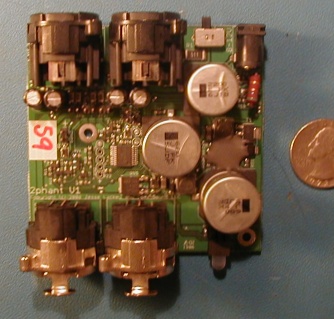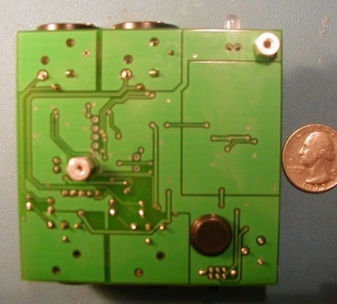Portable, battery powered 2-channel (full
10ma/channel!) phantom power unit
This web page documents the development of this design. This is a
shipping commercial product; pricing approx $250, inquire for details.
Board is 2-layer 3.1" x 3.0"
Design timeframe: Early 2005 to mid 2006
Last webpage update: May 19, 2007
Top View:

Bottom View:

This product is a spinoff of
the
high-performance phantom power circuit designed for the 4 channel design. The combination of
very low noise
and high efficiency is unmatched by any other portable phantom power
unit. This will run a pair of Earthworks microphones for hours!
Features:
- Best-in-the-world performance (no kidding.)
- 5 steps of battery level indication
- Hot-swappable batteries
- Um... on/off switch, DC input, ... not so many features in a
phantom power box. :)
Design
Good phantom power is surprisingly hard to do. The basic choices
to make 48V from a battery are a switchedcap array or a dc/dc
converter. Switchedcap generation is very low noise
but not efficient, generally doesn't produce a lot of power, and
requires additional design complexity
to keep the output voltage steady as the battery voltage drops.
dc/dc converters are noisy, even "low noise" ones, and few can boost
all the way to 48V.
A good deal of trial and error with several different designs and
constant checking on the Audio Precision 2522 was required to produce
this design. I cannot go into any technical details, sorry.
A simple PIC microcontroller reads the battery / DC input levels and
drives the indicator LED, controls inrush current to the huge caps, and
regulates 48V generation. The on/off switch also serves to drain
the caps quickly when powered off. A diode-OR arrangement is used
to combine power from the two batteries and protect against reverse
polarity.
Home

